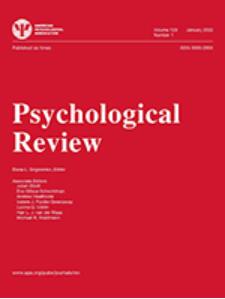Understanding self-control as a problem of regulatory scope.
IF 5.1
1区 心理学
Q1 PSYCHOLOGY
引用次数: 0
Abstract
Although the focus of research for decades, there is a surprising lack of consensus on what is (and what is not) self-control. We review some of the most prominent theoretical models of self-control, including those that highlight conflicts between smaller-sooner versus larger-later rewards, "hot" emotions versus "cool" cognitions, and efficient automatic versus resource-intensive controlled processes. After discussing some of their shortcomings, we propose an alternative approach based on tenets of construal level theory (Trope et al., 2021) that integrates these disparate models while also providing novel insights. Specifically, we model self-control as a problem of regulatory scope-the range of considerations one accounts for in any decision or behavior. Self-control conflicts occur when the pursuit of specific local opportunities threatens the ability to address motivational priorities that span a broader array of time, places, individuals, and possibilities. Whereas a more contractive consideration of relevant concerns may prompt indulgence in temptation, a more expansive consideration of concerns should not only help people identify the self-control conflict but also successfully resolve it. We review empirical evidence that supports this new framework and discuss implications and new directions. This regulatory framework not only clarifies what is and what is not self-control but also provides new insights that can be leveraged to enhance self-control in all its various forms. (PsycInfo Database Record (c) 2024 APA, all rights reserved).将自我控制理解为监管范围的问题。
尽管几十年来自我控制一直是研究的重点,但人们对什么是(什么不是)自我控制竟然缺乏共识。我们回顾了一些最著名的自我控制理论模型,包括那些强调 "越早越小 "奖励与 "越晚越大 "奖励之间的冲突、"火热 "情绪与 "冷静 "认知之间的冲突,以及高效的自动过程与资源密集型控制过程之间的冲突。在讨论了这些模型的一些缺点之后,我们提出了一种基于构解水平理论(Trope 等人,2021 年)的替代方法,该方法整合了这些不同的模型,同时还提供了新的见解。具体来说,我们将自我控制建模为一个调节范围问题--在任何决策或行为中考虑的范围。当追求特定的局部机会威胁到处理跨越更广泛的时间、地点、个人和可能性的动机优先事项的能力时,就会发生自我控制冲突。如果对相关问题的考虑更具收缩性,可能会促使人们沉溺于诱惑,而如果对相关问题的考虑更具扩展性,则不仅能帮助人们识别自我控制冲突,还能成功解决冲突。我们回顾了支持这一新框架的经验证据,并讨论了其影响和新方向。这个调节框架不仅澄清了什么是自我控制,什么不是自我控制,而且还提供了新的见解,可用于加强各种形式的自我控制。(PsycInfo Database Record (c) 2024 APA,保留所有权利)。
本文章由计算机程序翻译,如有差异,请以英文原文为准。
求助全文
约1分钟内获得全文
求助全文
来源期刊

Psychological review
医学-心理学
CiteScore
9.70
自引率
5.60%
发文量
97
期刊介绍:
Psychological Review publishes articles that make important theoretical contributions to any area of scientific psychology, including systematic evaluation of alternative theories.
 求助内容:
求助内容: 应助结果提醒方式:
应助结果提醒方式:


